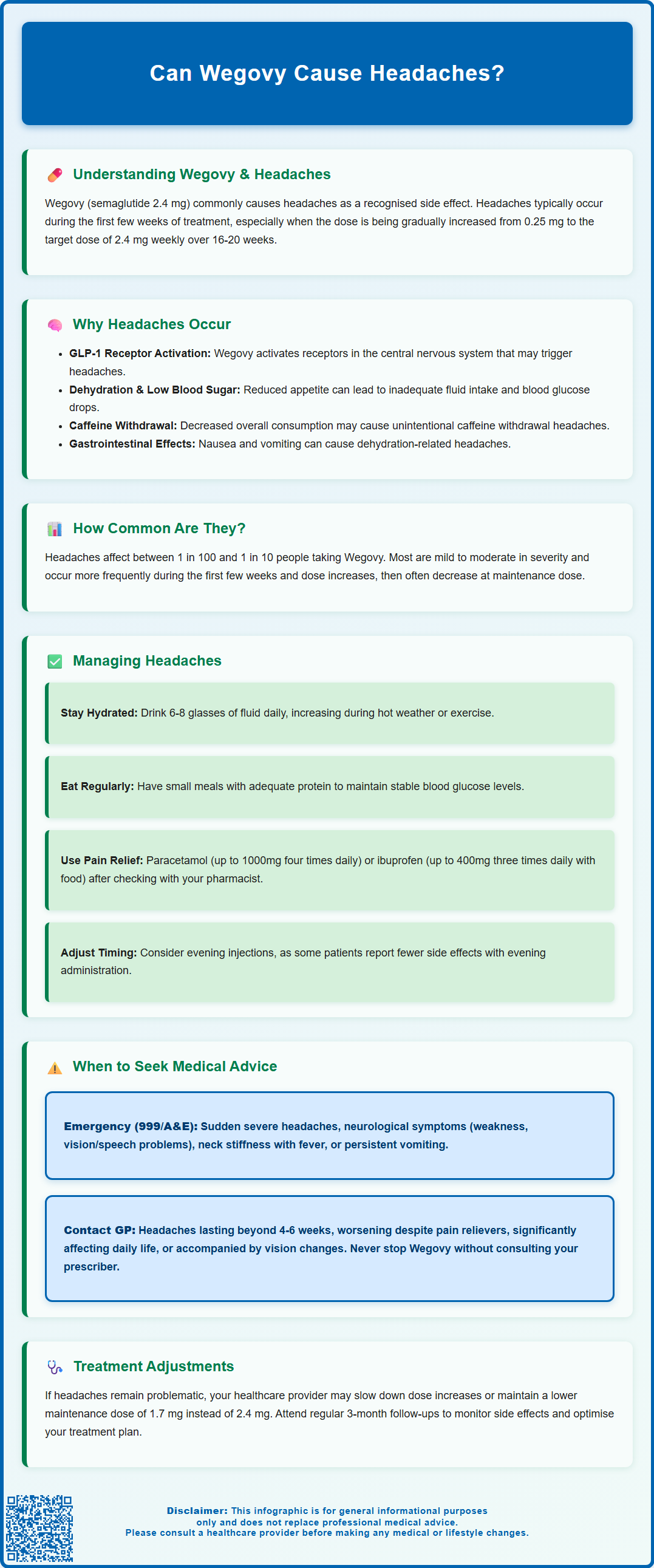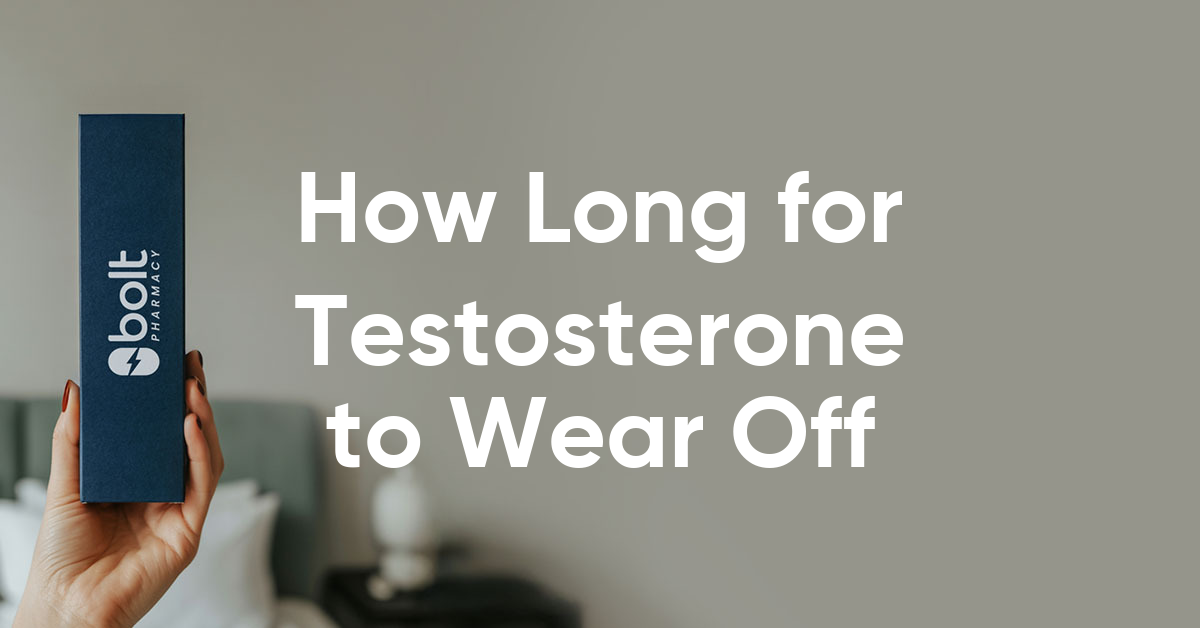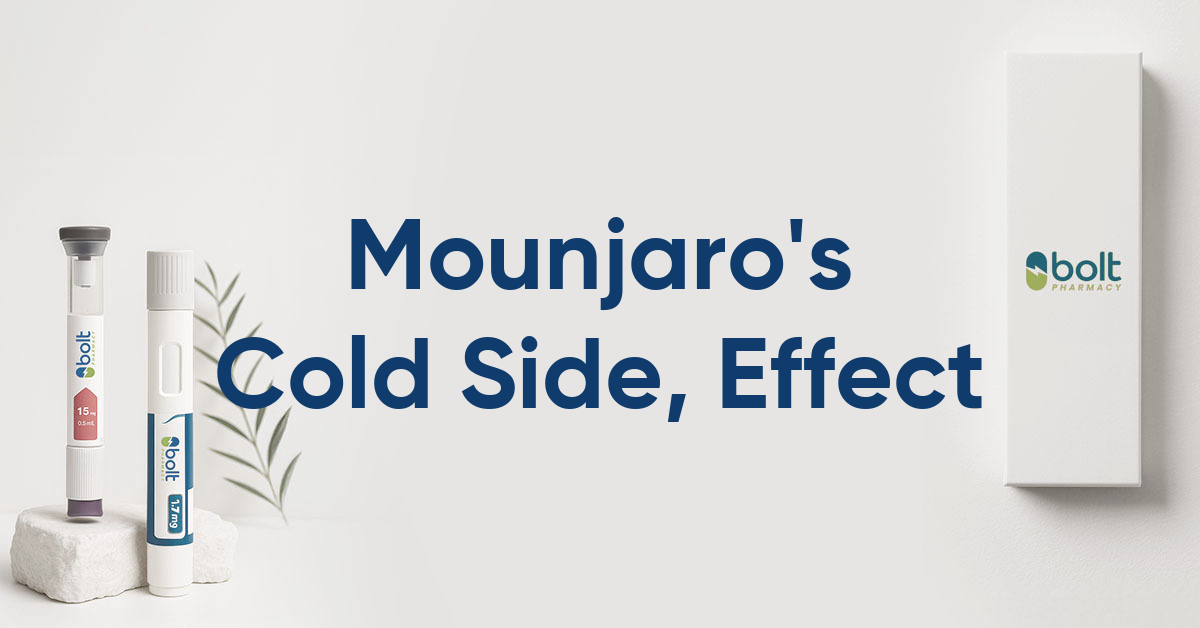Wegovy (semaglutide 2.4 mg) can cause headaches as a recognised adverse effect in some patients. Headaches are classified as a common side effect in the Summary of Product Characteristics approved by the Medicines and Healthcare products Regulatory Agency. Wegovy is a GLP-1 receptor agonist prescribed for chronic weight management in adults with obesity or overweight with comorbidities, in line with NICE Technology Appraisal 875. Headaches typically emerge during initial treatment weeks and dose escalation phases. Understanding this recognised side effect helps patients and healthcare professionals anticipate and manage symptoms appropriately through hydration, dietary strategies, and simple analgesics when needed.
Summary: Yes, Wegovy (semaglutide 2.4 mg) can cause headaches as a common adverse effect, typically emerging during initial treatment weeks and dose escalation.
- Wegovy is a GLP-1 receptor agonist prescribed for chronic weight management in adults with BMI ≥30 kg/m² or ≥27 kg/m² with comorbidities.
- Headaches are classified as 'common' (affecting 1 in 100 to 1 in 10 people) in clinical trials and regulatory documentation.
- Contributing factors may include GLP-1 receptor effects, reduced caloric intake, dehydration, hypoglycaemia, and gastrointestinal side effects.
- Management includes maintaining hydration, regular small meals, simple analgesics (paracetamol or ibuprofen), and potentially adjusting titration schedules.
- Seek immediate medical attention for sudden severe headache, neurological symptoms, neck stiffness with fever, or persistent vomiting.
- Report all side effects to your healthcare professional and via the MHRA Yellow Card scheme to support medication safety monitoring.
Table of Contents
Can Wegovy Cause Headaches?
Yes, Wegovy (semaglutide 2.4 mg) can cause headaches as a recognised adverse effect. Headaches are listed among the common side effects in the Summary of Product Characteristics (SmPC) approved by the Medicines and Healthcare products Regulatory Agency (MHRA) and available on the electronic Medicines Compendium (EMC).
Wegovy is prescribed for chronic weight management in adults with a body mass index (BMI) of 30 kg/m² or greater, or 27 kg/m² or greater in the presence of at least one weight-related comorbidity, in accordance with NICE Technology Appraisal 875. The medication works by mimicking the naturally occurring hormone GLP-1, which regulates appetite and food intake through actions on the brain's satiety centres.
Headaches associated with Wegovy typically emerge during the initial weeks of treatment, particularly during dose escalation phases. The medication follows a gradual titration schedule, starting at 0.25 mg weekly and increasing incrementally over 16–20 weeks to the maintenance dose of 2.4 mg weekly. If the 2.4 mg dose is not tolerated, the SmPC notes that some patients may remain on 1.7 mg as a maintenance dose. This stepwise approach aims to improve gastrointestinal tolerability, though it does not eliminate all adverse effects. Understanding that headaches represent a recognised side effect can help patients and healthcare professionals anticipate and manage this symptom appropriately.

Why Headaches Occur with Wegovy
The precise mechanisms underlying Wegovy-induced headaches are not fully understood, though several factors may contribute. Semaglutide acts on GLP-1 receptors throughout the body, including those present in the central nervous system. It is hypothesised that these effects might influence physiological processes that could potentially trigger headache symptoms in some individuals, though the exact pathways remain under investigation.
Changes in eating patterns and caloric intake may also play a role. Wegovy significantly reduces appetite and food consumption, which constitutes its primary therapeutic effect. However, this reduction in nutritional intake may lead to:
-
Dehydration – Reduced fluid consumption alongside decreased food intake
-
Hypoglycaemia – Lower blood glucose levels, particularly in patients taking concurrent glucose-lowering medications such as insulin or sulfonylureas
-
Potential electrolyte changes – Particularly if experiencing gastrointestinal side effects
-
Caffeine withdrawal – Unintentional reduction in habitual caffeine consumption
The medication's gastrointestinal effects, including nausea and vomiting (very common adverse reactions), may indirectly contribute to headaches through dehydration. Nausea-related headaches can present with various characteristics and may compound other headache types.
Additionally, the subcutaneous injection itself rarely causes localised reactions, though systemic headaches are more commonly related to the medication's systemic effects rather than the injection process. Individual susceptibility varies considerably, with some patients experiencing no headaches whilst others report symptoms requiring management strategies.
How Common Are Headaches on Wegovy?
According to the European Public Assessment Report (EPAR) for Wegovy, headaches were reported in clinical trials as a common side effect. In the MHRA/EMA classification system, 'common' means the side effect affects between 1 in 100 and 1 in 10 people (≥1/100 to <1/10), while 'very common' side effects affect 1 in 10 or more people (≥1/10).
The pivotal STEP (Semaglutide Treatment Effect in People with obesity) clinical trial programme, which enrolled over 4,500 participants across multiple studies, provides evidence regarding the incidence and characteristics of headaches associated with semaglutide 2.4 mg.
In the STEP trials, headaches were reported more frequently in the semaglutide group compared with placebo recipients. Most headaches were classified as mild to moderate in severity, with severe headaches occurring infrequently. Importantly, headaches rarely led to treatment discontinuation, suggesting that most patients found them manageable with appropriate support.
The pattern of headache occurrence may show variation:
-
Headaches may be more common during the initial weeks of treatment and dose escalation
-
Frequency often diminishes as patients reach maintenance dosing and physiological adaptation occurs
-
Individual susceptibility varies considerably
If you experience headaches or any other side effects while taking Wegovy, you should report them to your healthcare professional. You can also report suspected side effects directly via the MHRA Yellow Card scheme (yellowcard.mhra.gov.uk or the Yellow Card app), which helps monitor medication safety.
Managing Headaches While Taking Wegovy
Effective management of Wegovy-related headaches involves both preventative strategies and symptomatic treatment approaches. Patients should be encouraged to implement lifestyle modifications alongside pharmacological interventions when necessary, always under guidance from their prescribing clinician or pharmacist.
Maintaining good hydration is important. The NHS recommends drinking 6-8 glasses of fluid daily, which may need to be increased during warmer weather or physical activity. People with certain heart, kidney or liver conditions who are on fluid restriction should follow their healthcare professional's specific advice about fluid intake.
Dietary considerations include:
-
Regular, small meals – Even with reduced appetite, maintaining consistent blood glucose levels helps prevent headaches related to low blood sugar
-
Adequate protein intake – Supports metabolic function during weight loss
-
Monitoring caffeine consumption – Maintaining usual caffeine intake prevents withdrawal headaches; however, excessive caffeine should be avoided
-
Identifying trigger foods – Some patients notice headaches correlate with specific dietary choices
Pharmacological management options include simple analgesics such as paracetamol (up to 1000 mg, four times daily, maximum 4g in 24 hours) or ibuprofen (up to 400 mg, three times daily with food, maximum 1.2g in 24 hours for over-the-counter use). Ibuprofen should be avoided if you are dehydrated or have a history of stomach ulcers, kidney problems, or certain other conditions. Always check with your pharmacist before taking any over-the-counter medicines, particularly if you are already taking other medications containing paracetamol.
Timing of Wegovy administration may be flexible. The injection can be given at any time of day, with or without meals. Some patients report fewer symptoms when administering their weekly injection in the evening, though evidence for this approach is anecdotal.
Your prescriber may consider adjusting your treatment if headaches are problematic, such as slowing the titration schedule or maintaining a lower dose (such as 1.7 mg) as mentioned in the SmPC.
Stress management and adequate sleep (7–9 hours nightly) support overall wellbeing and may reduce headache frequency.
When to Seek Medical Advice About Wegovy Headaches
Whilst most Wegovy-related headaches are mild and self-limiting, certain presentations warrant prompt medical evaluation. It's important to recognise when headaches might indicate a more serious condition.
Seek immediate medical attention (call 999 or attend A&E) if headaches are accompanied by:
-
Sudden, severe headache with explosive onset ('thunderclap' quality)
-
Neurological symptoms – weakness, numbness, visual disturbances, speech difficulties, or altered consciousness
-
Neck stiffness with fever – potential meningitis
-
Severe headache following head injury
-
Headache with persistent vomiting that prevents oral intake or medication administration
For people over 50 years, new headaches with jaw pain when chewing, scalp tenderness, or visual symptoms require same-day medical assessment (potential giant cell arteritis).
Contact your GP or prescribing clinician within 24–48 hours if:
-
Headaches persist beyond the first 4–6 weeks of treatment without improvement
-
Headache severity progressively worsens despite simple analgesics
-
Headaches significantly impact daily functioning or quality of life
-
New headache patterns emerge that differ from your usual headache type
-
You experience visual changes, including blurred vision or eye pain (which may have various causes)
-
Headaches are accompanied by persistent nausea preventing adequate nutrition or hydration
Your healthcare provider may consider:
-
Temporarily pausing dose escalation – maintaining the current dose for an additional week before increasing
-
Reviewing concurrent medications – assessing potential drug interactions
-
Investigating alternative causes – ensuring headaches are attributable to Wegovy rather than unrelated conditions
-
Adjusting treatment regimen – including possibly maintaining a lower dose (1.7 mg) if 2.4 mg is not tolerated
Do not stop or change your dose of Wegovy without discussing with your prescriber. If you're unsure about the urgency of your symptoms, contact NHS 111 for advice. NICE guidance on obesity management emphasises the importance of regular clinical review for patients receiving weight management medications, with follow-up appointments typically scheduled at 3-month intervals to discuss effectiveness and any side effects.
Scientific References
- Wegovy 0.25 mg, FlexTouch solution for injection in pre-filled pen - Summary of Product Characteristics.
- Once-Weekly Semaglutide in Adults with Overweight or Obesity.
- Semaglutide for managing overweight and obesity. Technology Appraisal Guidance [TA875].
- Overweight and obesity management. NICE Guideline [NG246].
Frequently Asked Questions
How long do Wegovy headaches typically last?
Wegovy-related headaches typically emerge during the initial weeks of treatment and dose escalation phases. Most patients experience improvement as they reach maintenance dosing and physiological adaptation occurs, usually within 4–6 weeks of starting treatment.
What can I take for headaches whilst on Wegovy?
Simple analgesics such as paracetamol (up to 1000 mg four times daily, maximum 4g in 24 hours) or ibuprofen (up to 400 mg three times daily with food) can be used for Wegovy-related headaches. Always check with your pharmacist before taking over-the-counter medicines, particularly if you are taking other medications.
Should I stop taking Wegovy if I get headaches?
Do not stop or change your dose of Wegovy without discussing with your prescriber. Most Wegovy-related headaches are mild to moderate and manageable with hydration, dietary strategies, and simple analgesics. Your healthcare provider may consider adjusting your titration schedule or maintaining a lower dose if headaches are problematic.
The health-related content published on this site is based on credible scientific sources and is periodically reviewed to ensure accuracy and relevance. Although we aim to reflect the most current medical knowledge, the material is meant for general education and awareness only.
The information on this site is not a substitute for professional medical advice. For any health concerns, please speak with a qualified medical professional. By using this information, you acknowledge responsibility for any decisions made and understand we are not liable for any consequences that may result.
Heading 1
Heading 2
Heading 3
Heading 4
Heading 5
Heading 6
Lorem ipsum dolor sit amet, consectetur adipiscing elit, sed do eiusmod tempor incididunt ut labore et dolore magna aliqua. Ut enim ad minim veniam, quis nostrud exercitation ullamco laboris nisi ut aliquip ex ea commodo consequat. Duis aute irure dolor in reprehenderit in voluptate velit esse cillum dolore eu fugiat nulla pariatur.
Block quote
Ordered list
- Item 1
- Item 2
- Item 3
Unordered list
- Item A
- Item B
- Item C
Bold text
Emphasis
Superscript
Subscript












